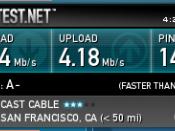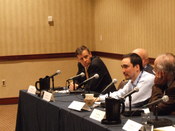The Internet Freedom Preservation Act of 2009 (H.R. 3458), the bill advocating "Network Neutrality" for the Internet, should be passed by the U.S. Congress and made law because the FCC and current President support a neutral internet, it will regulate certain actions by Internet service providers (ISPs) that have been found unlawful or discriminatory, and it will continue the status quo for users and content providers that currently utilize an open and unfettered broadband service. The bill is designed to amend the Communications Act of 1934 to limit the internet service providers in the U.S. from blocking information or diminishing quality of service to end users regardless of the applications they are using or the content they are accessing, given the content is lawful (Hahn, 108-109). H.R. 3458 tries to address a debate that is escalating between content providers such as Google/YouTube, Amazon, and Yahoo and internet service providers such as AT&T, Verizon, and Comcast.
The broad term used in this debate is "Network Neutrality," however, the issue address here and in this bill is more clearly identified as the difference between ISP controlled access to content, and consumer (end-user) controlled access to content (Stanton, p12-13).
Current U.S. President Barack Obama and FCC Chairman Julius Genachowski have both stated publically that they have strong support for "Net Neutrality." As reported in the Multichannel News by John Eggerton on June 1, 2009, Barack Obama stated, "I remain firmly committed to 'net neutrality,' so we can keep the Internet as it should be-open and free (p.3)" Genachowski has a powerful position as FCC Chairman when dealing with Internetworking standards in the U.S., and he proposed some new rules when speaking at the Brookings Institute on Sept. 21, 2009, including: not allowing ISPs to slow down or block content from another...


